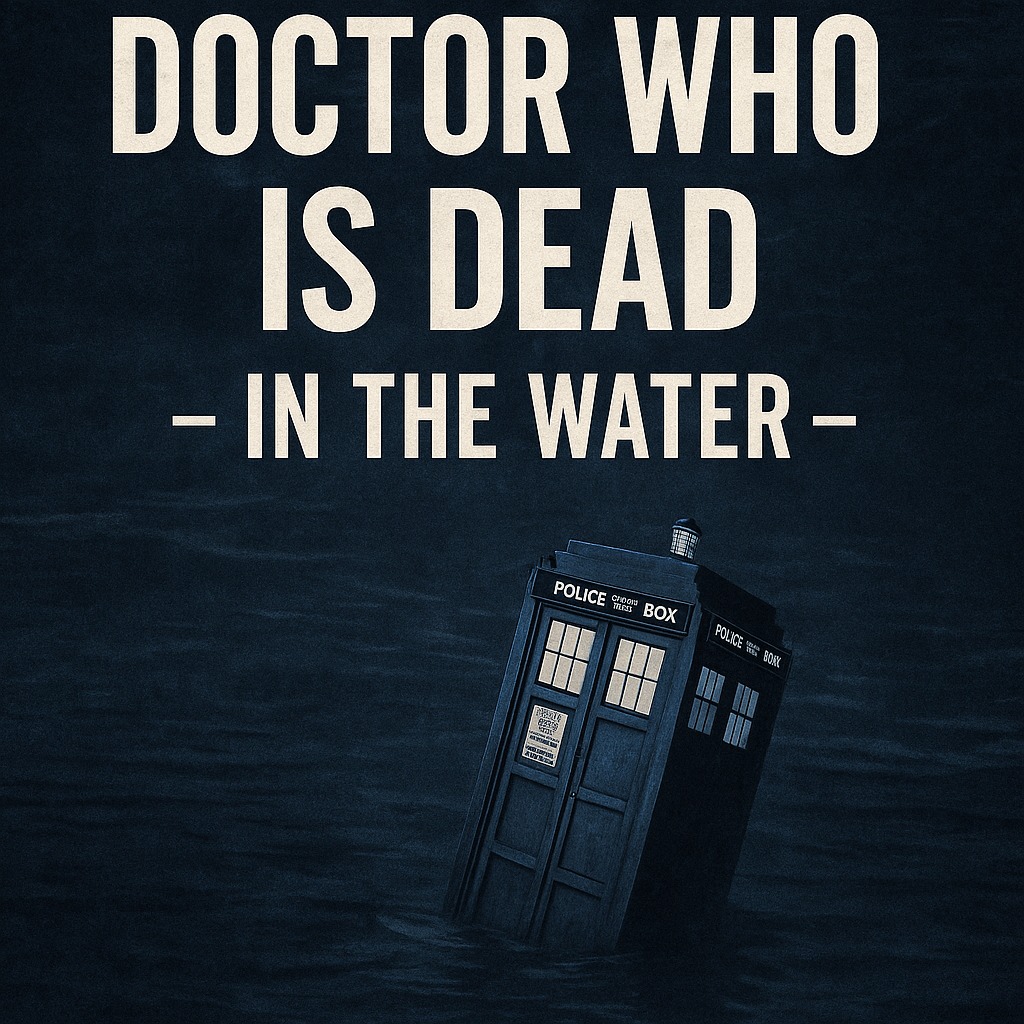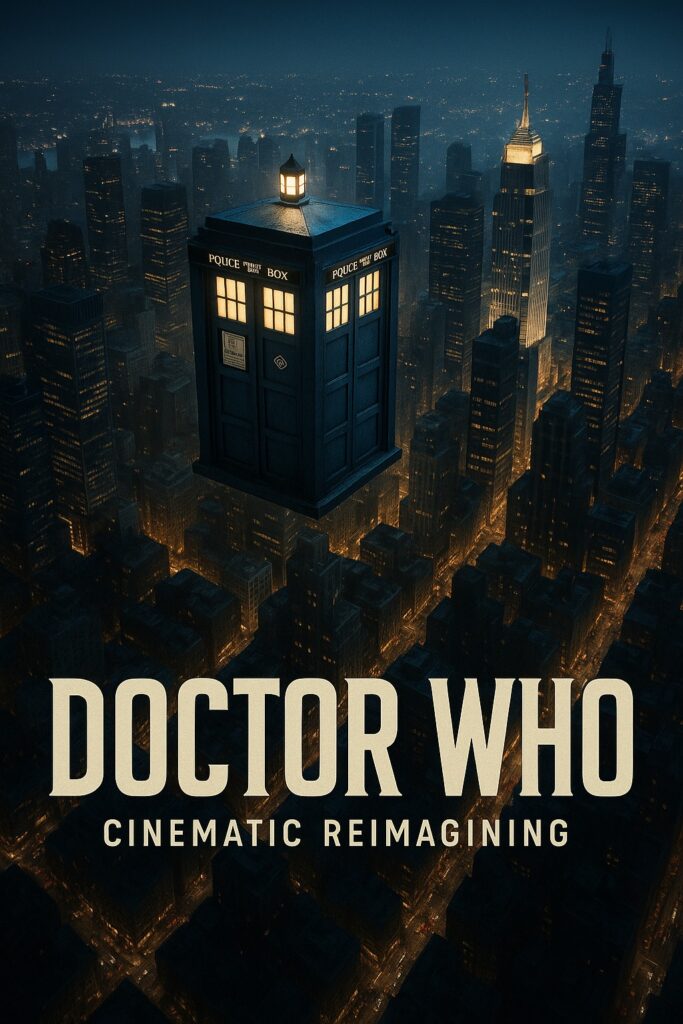
There’s a harsh truth fans must now face: Doctor Who, in its current TV form, is finished. The signs are everywhere — the erratic storytelling, the bewildering regeneration, the vanished audience, and the exit of Russell T Davies — and they point to one conclusion: this show died the moment it tried to have everything and ended up meaning nothing.
Yet in its death lies hope. The only way forward is a full-blown cinematic reboot — not just another streaming series — to resurrect Doctor Who properly, at scale, with the gravitas, spectacle, and ambition this mythos deserves.
The Death Warrant: How It All Fell Apart
1. Russell T Davies (RTD) Is Gone — Permanently
Fans worship RTD, and with reason: his 2005 revival of Who was electric, heartfelt, and full of wonder. But brilliance is not immune to erosion. Davies’ return in recent seasons felt like a haunted echo of his earlier success, and rumours suggest even Disney pushed for his removal.
The creative lifeblood of this era is gone. And without him — and without his voice guiding and restraining the show — Doctor Who has no compass.
2. The Billie Piper Regeneration: A “F” You” Swan Song
Let’s not sugar-coat it: having Ncuti Gatwa’s Doctor regenerate into Billie Piper (a former companion, not credited straightforwardly as the Doctor) reeks of spite, confusion, and broken trust. The ending was was reshot at the last minute, along with Ncuti Gatwa’s decision to leave the role of the Doctor, in the full knowledge that it will not be coming back for sometime, but one suspects Billie Piper’s involvement was added shortly before broadcast, when RTD knew it was the end of his era as Doctor Who showrunner and writer. The fans lost out in the end, left with unresolved questions surrounding the reappearance of the Doctor’s granddaughter, Susan. I guess we will never know now what could have been.
This wasn’t bold storytelling — it was scattershot theatricality. It burned the bridge with fans who expected coherence, not shock-for-shock’s sake.
3. The Audience Has Fled (And With Good Reason)
Even with Disney’s deep pockets, Doctor Who failed to maintain critical mass viewers. Latest seasons have posted historically weak numbers.
Meanwhile, long-time fans openly lament the direction — many feeling RTD chased “woke agenda” angles at the expense of the wonder, mystery, and emotional stakes that originally bound the show’s fandom.
When a franchise loses both the casual audience and its core believers, it’s not evolving — it’s dying.
4. The Identity Crisis: What Is Doctor Who Now?
The show tried to weave in everything: queer narratives, intersectional politics, modern social issues, cosmic horror, legacy characters, wild temporal gimmicks. But in reaching for all that, it lost the clarity of its identity.
Classic Who was about adventure, moral stakes, big weird ideas — but always anchored by a strong internal logic. The current incarnation has shattered that logic for shock payoffs.
What does the Doctor stand for now? Who knows.
The Case for a Cinematic Reboot
If “Doctor Who” is to live again, it cannot rise in the same old trenches of episodic TV. It must emerge as cinema first, then stream — and it must do so at a scale and ambition worthy of its legacy.
Why Cinema — and Why Now?
- Bigger, bolder stakes: The Doctor deserves blockbuster battles, awe, spectacle. That’s hard to sustain weekly on a TV budget.
- Event status: A Who movie becomes a moment — marketing, fandom frenzy, tentpole box office.
- Creative reset: Films allow structural clean slates. You reboot everything (canon, tone, rules) without decades of baggage pinning you down.
- Merch & licensing: Cinematic reboots fuel massive spin-offs, toys, games — revitalising the brand.
- Crossovers & cinematic universes: Why not cross Who with other sci-fi legacies (e.g. Star Trek, through a Paramount / Skydance collaboration)? The U.K. sci-fi domain is ripe for a shared universe.
What That Reboot Should Be (Not What It Should Avoid)
- Reclaim tonal clarity: Sci-fi wonder, danger, consequence, whimsy — with internal consistency.
- Respect Who DNA: The Doctor as moral protagonist, sacrifice, curiosity, lonely burdens.
- Diverse cast without polemic: Inclusion as character logic, not checkbox.
- Big names attached: Directors like Nolan, Ridley Scott, Mendes, Jackson; writers like Neil Gaiman, Charlie Brooker, Jesse Armstrong.
- Multi-film arc: Allow each film to build myth, mystery, evolution.
- TV spin-offs only after the world is resettled: Let the movies do the heavy lifting; side stories after the foundation is secure.

Addressing Objections & Risks
- “But Doctor Who is a TV show — its charm is in the serials.” That’s true. But Star Wars has theatrical heritage and thriving TV side stories. Who can invert the model: cinema first, TV later.
- “It’s too expensive and risky.” Yes — but the brand is global and beloved. A well-made Doctor Who film with a £200–£300M budget is not more absurd than big comic adaptations.
- “You’ll alienate fans who love the TV era!” The TV version already feels alienated from many fans. A reboot gives them something new to root for, not a rehash.
- “Transitions are messy.” Yes. But piecemeal bandages (e.g. reshoots, gimmick regenerations) are what broke the show’s credibility. Better to take a scar on the way up than limp further down.
Timeline & Forecast
- Expect a hiatus of 3–6 years minimum. Many insiders already hint at long dormancy.
- During that time, the BBC or rights holders should negotiate a film partnership (e.g. with a major studio).
- The first film must drop with fanfare — properly cast Doctor, bold narrative, visual scale.
- After film success, build streaming tie-ins, limited series, spin-offs.
- Eventually, return to TV incarnation — but derived from and referencing the cinematic lore.
Doctor Who Dies to Be Reborn
Yes — Doctor Who as we currently know it is on life support. Trying to patch it with shock twists or legacy fan service only hastens the collapse. The Doctor deserves more than a last gasp.
So let it end — for now. Let it rest.
Then let it arise — realigned, remade, and reborn for the big screen.
That is the future Doctor Who must have — bold, cinematic, meaningful.
Otherwise, we risk 60 years of myth being buried by its own overreach.
If the BBC and the studios are serious about taking Doctor Who into the cinematic age, then casting becomes everything. Imagine Benedict Cumberbatch or Idris Elba stepping into the role — each bringing gravitas, charisma, and a distinct tone the franchise has never fully embraced on screen.
Or picture a film opening with Sir Anthony Hopkins as the original Doctor — older, wise, burdened by centuries of consequence — who regenerates into a younger Doctor played by either of the two aforementioned actors.
Then there’s the human connection — the companions.
Imagine Millie Bobby Brown and Felicity Jones as the Doctor’s new partners in time and space — youthful energy meeting emotional depth, grounding the story in heart and humanity.
🎬 Now here’s the question:
✨ The Future: Who Will Be the Next Doctor?
Which Hollywood or British actor would you cast as the next Doctor?
Drop your thoughts below, because this debate — just like the TARDIS — is far from over.

Doctor Who cinematic adventure is just what we need